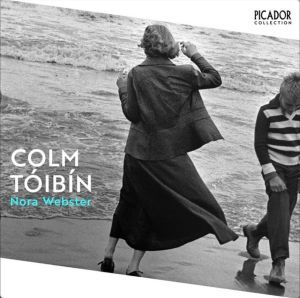Book Review: Nora Webster by Colm Tóibín
It is the late 1960s in Ireland. Nora Webster is living in a small town, looking after her four children, trying to rebuild her life after the death of her husband. She is fiercely intelligent, at times difficult and impatient, at times kind, but she is trapped by her circumstances, and waiting for any chance which will lift her beyond them.
Slowly, through the gift of music and the power of friendship, she finds a glimmer of hope and a way of starting again. As the dynamic of the family changes, she seems both fiercely self-possessed but also a figure of great moral ambiguity, making her one of the most memorable heroines in contemporary fiction.
The portrait that is painted in the years that follow is harrowing, piercingly insightful, always tender and deeply true. Nora Webster is a novel that illuminates our own lives in a way that is rare in literature. Its humanity and compassion forge an unforgettable reading experience.
Published by Pan Macmillan Australia
Released February 2015
 My Thoughts:
My Thoughts:After a very good audiobook followed by two non-starters, I needed something that was going to be a guaranteed good read for my next one, and in Nora Webster, I not only found that, but I also found what might just be the most perfect novel in existence. Already a Tóibín fan, with the previous three of his I’ve read all coming in at five stars, this one has nudged itself into the top spot as my favourite by him, but also, now, one of my favourite novels of all time.
‘She thought of the book she had bought in Dublin. She could not remember what had made her buy it. She went out to the kitchen and searched for it in her bag. As soon as she opened the book she put it down again. She closed her eyes. In future, she hoped, fewer people would call. In future, once the boys went to bed, she might have the house to herself more often. She would learn how to spend these hours. In the peace of these winter evenings, she would work out how she was going to live.’
Nora Webster, so named after the main character of this story, is a novel of grief, of piecing your life back together after the death of a husband and father, the breadwinner, the glue that held the family together. We step into the lives of the Webster family six months on from the tragic loss of Maurice to heart disease, and we remain with them for several years on. Nora is living in the family home with the two youngest, sons, who are on the cusp of their teenage years, and the two eldest, daughters, are living away from home, one at boarding school, the other at a training college for teachers. Nora is emotionally supported by her late husband’s brother and sister, who are both unmarried and childless and generous with their attention and financial support for the children. Her relationship with her own sisters is more fraught, but her aunt Josie, who is her late mother’s sister, is supportive and was the one who cared for the boys in the months that Maurice was dying while Nora was with him throughout. Moving forward, Nora needs to find employment, as her widow’s pension is not sufficient to live on.
‘She wondered for a second if all the years of being away from work, the years spend cooking and cleaning the house and looking after the children and then being with Maurice when he was sick had affected her ability to keep her mind on the same single thing.’
And so begins a story of piecing one’s life back together after tragedy, but with a new picture taking shape from the broken pieces. Learning to be a family anew, making new friends and developing new interests to fill the void of a person no longer there and hours upon hours to spare. That fine line between despair born out of grief along with happiness in newly discovered connections and interests. The way that Nora began to get to know herself, as a person as well as a single parent, was a gentle unfolding that I felt enormously appreciative of.
‘So this was what being alone was like, she thought. It was not the solitude she had been going through, not the moments when she felt his death like a shock to her system, as though she had been in a car accident, it was this wandering in a sea of people with the anchor lifted, and all of it oddly pointless and confusing.‘
Against this backdrop of domesticity, so much more is conveyed about other people, the community, Ireland itself, and even Northern Ireland. Nora encounters issues at work and becomes part of a trade union movement, and then there’s the escalation of violence in Derry and Belfast, which is captivating all of Ireland each time it hits the news, and draws Nora’s second eldest daughter into its realm as she joins protests in Dublin. There are conversations between people, thoughts and processing about life and the community, politics and religion. This is what Tóibín does, he creates a universe and enfolds you within it with his clear and precise words, his finely drawn characters, his colourful Ireland.
‘Well, it’s funny, isn’t it?’ Aine asked. ‘The Irish Army can go to the Congo and to Cyprus, but it can’t go into Derry to help our own people.’
Throughout reading this novel, I was struck over and over how much empathy Tóibín writes with, particularly in his women. Nora was the most beautiful mother, by no means perfect, often second guessing herself, but motivated by love and acting primarily with instinct and restraint, particularly with her sons. I felt so much love poured into Nora by Tóibín, that it came as no surprise, and such a delight, to discover that Nora Webster was written as a tribute to his own mother. Other women were written with such empathy and intent, Josie, Phyllis, Laurie, and Sister Thomas. I do want to give a little shout out to Sister Thomas, who was divine, in every sense of the word.
‘It occurred to her that in any other century, Sister Thomas would have been burned as a witch.’
If you have never read Colm Tóibín, I would encourage you to begin with Nora Webster. It is him at his finest, at his most accessible and comforting, and reading this novel brought me so much joy, even through the sad parts. Nora Webster is literary perfection, an absolute darling of a novel that I will hold close to my heart and widely recommend to all.
‘She knelt down and slowly fed the letters into the fire. She thought about how much had happened since they were written and how much they belonged to a time that was over now and would not come back. It was the way things were; it was the way things had worked out.’



